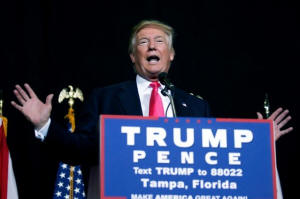|
Trump targets China trade, says plans
serious measures
 Send a link to a friend
Send a link to a friend
 [August 25, 2016]
WASHINGTON (Reuters) - Republican
presidential candidate Donald Trump threatened on Wednesday to slap
tariffs on Chinese products to show Beijing that the United States is
"not playing games anymore" when it comes to leveling the field on
trade. [August 25, 2016]
WASHINGTON (Reuters) - Republican
presidential candidate Donald Trump threatened on Wednesday to slap
tariffs on Chinese products to show Beijing that the United States is
"not playing games anymore" when it comes to leveling the field on
trade.
Addressing a rally in Tampa, Florida, Trump said that if he was elected
in November, he would instruct the U.S. trade representative to bring
cases against China both in the United States and at the World Trade
Organization.
Tariffs would be necessary in some cases "because they have to
understand that we're not playing games anymore," he added. Trump had
previously pledged a 45 percent tariff on Chinese goods.
Trump said on Wednesday that the trade deficit with China was more than
$500 billion, although the figure given by the U.S. government put it at
$367 billion in 2015. The United States has brought cases against China
at the WTO, and U.S. officials have frequently slapped antidumping and
countervailing duties on Chinese products under U.S. law based on
complaints brought by U.S. producers.

"We believe that whoever wins the U.S election, future U.S. leaders will
continue to adopt a basic policy of mutual cooperation with China that
accords with U.S. interests and the interests of the U.S. people,"
Chinese Foreign Ministry spokesman Lu Kang told reporters on Thursday.
[to top of second column] |

Republican presidential nominee Donald Trump speaks at a campaign
rally in Tampa, Florida, U.S., August 24, 2016. REUTERS/Carlo
Allegri

Trump, who is running behind Democratic presidential candidate Hillary
Clinton in opinion polls, has pledged to return manufacturing jobs to
America, although many economists believe that the "China shock" has
long since passed.
Economists at the Federal Reserve and elsewhere estimate that the
"China shock" in the wake of the country's accession to the WTO cost
800,000 to 1 million jobs in the United States. By way of
comparison, U.S. manufacturing has shed 5 million jobs since 2000.
(Reporting by Steve Holland; Additional reporting by Michael Martina
in Beijing; Writing by Tim Ahmann and David Chance; Editing by
Frances Kerry and Jonathan Oatis)
[© 2016 Thomson Reuters. All rights
reserved.]
Copyright 2016 Reuters. All rights reserved. This material may not be published,
broadcast, rewritten or redistributed. |